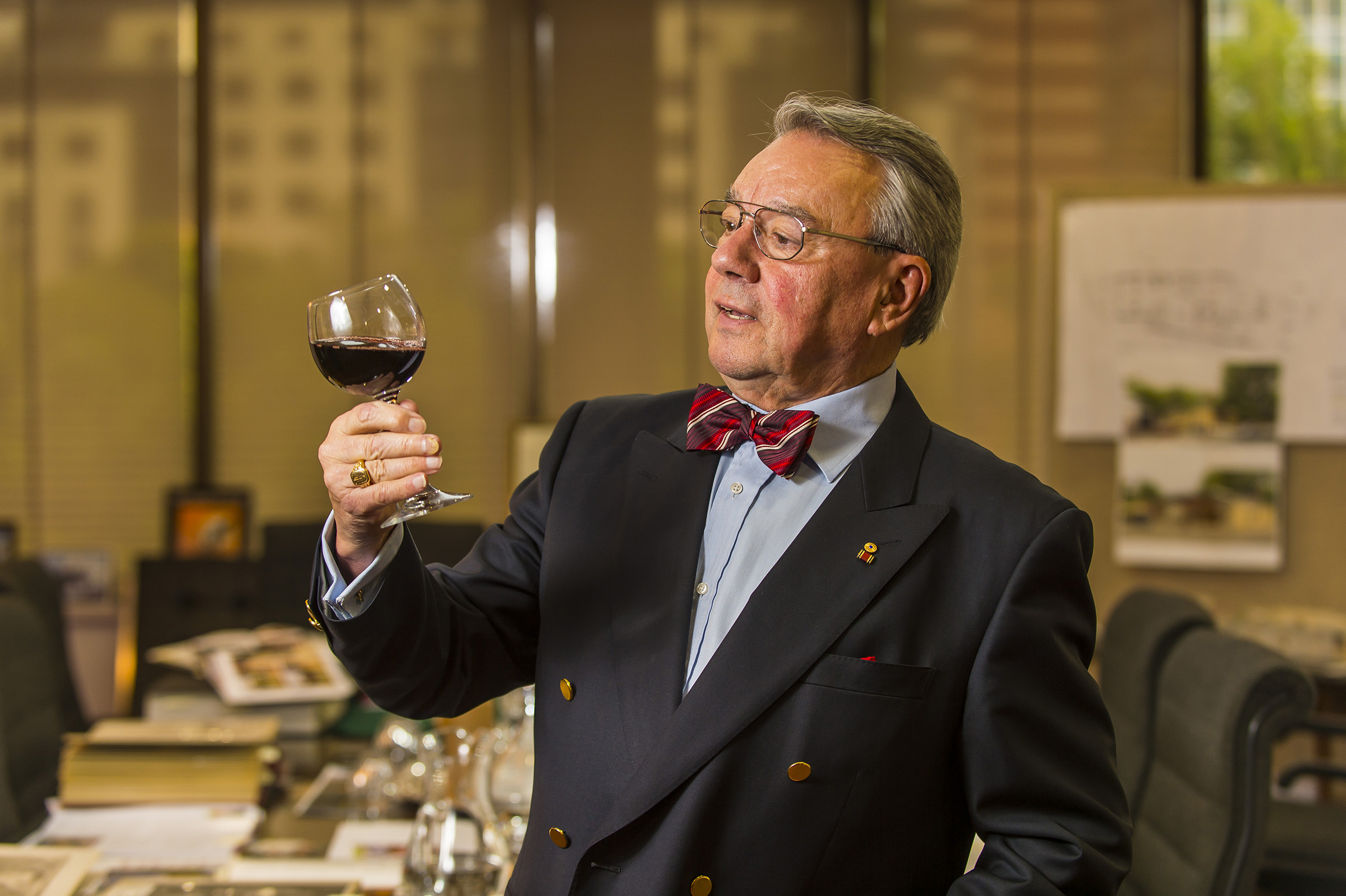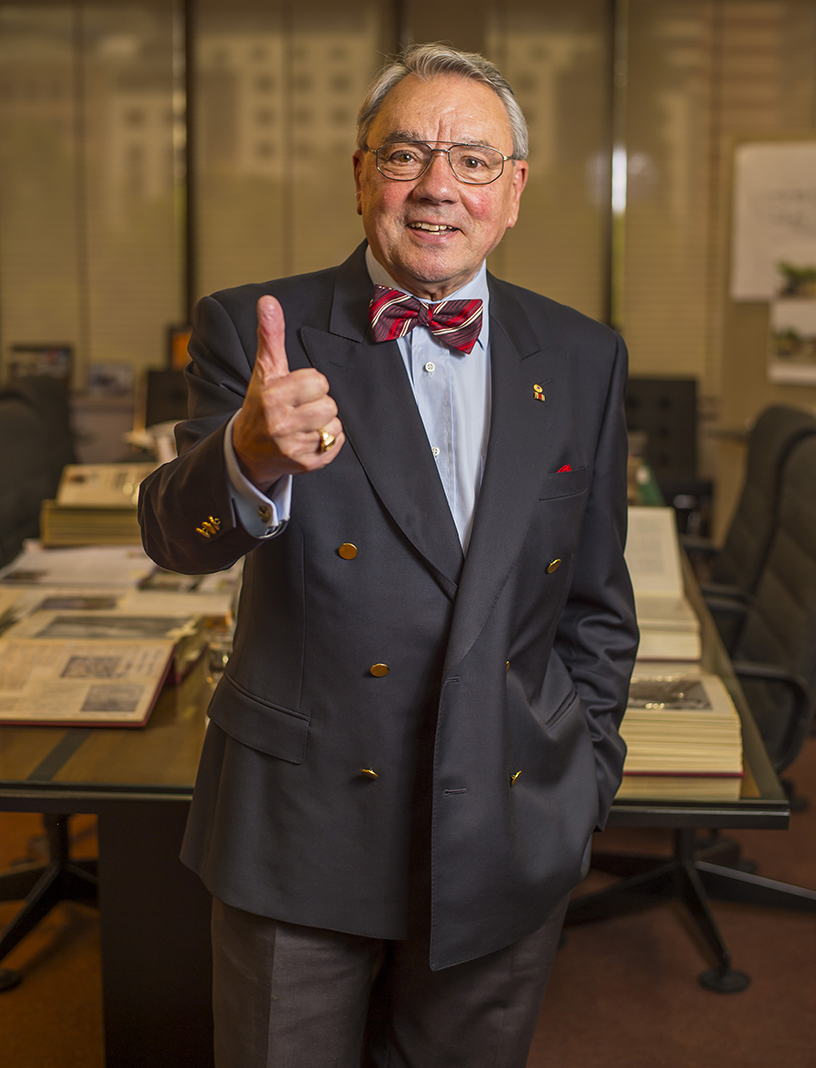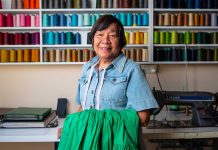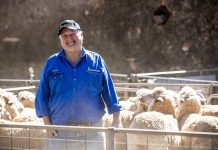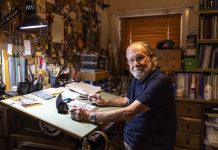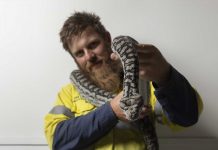Wolf Blass; the maverick, the mogul, the man
He’s the name behind one of the most famous wineries in the country, an industry mogul whose personality is as big and bold as the internationally recognised wines he puts his name to.
Winemaking maverick, Mr Wolf Blass AM sits in the board room of his Hindmarsh Square Office, walls lined with accolades and images of memorable moments captured time.
It’s obvious he has earned the utmost respect from his peers.
On the board room table is memorabilia showcasing an incredible life, from a humble birth certificate dated September 2, 1934 Stadtilm, East Germany, through to extravagant 80th birthday celebration photographs and publications.
The collection is massive and tells the story of a wine industry character whose innovation and determination has helped bring the Barossa to the world stage alongside the likes of Penfold’s Max Schubert, Orlando’s Guenter Prass and Peter Lehmann whom he proudly called friends.
“Considering my age, there are not many of us around anymore!” Wolf says in his thick German accent, adding to his already larger than life personality.
Paging through hand written notes, he’s about to tell the story of his life in Australia, his eyes sparkling with enthusiasm because he knows it’s a great tale.
It begins with a highly trained young German winemaker with a “Kellermeister” Diploma from Wurzburg Wine University, working in Bristol, England.
The year is 1960.
“I had an offer from Kaiser Stuhl or The Barossa Valley Co-operative. They were looking for somebody to generate the sparkling wine business in competition against Orlando’s Barossa Pearl,” he explains. “That was the in thing at the time.
“I could have gone to Venezuela, I had an offer there… I was a bachelor, I thought there were some hot birds there but a revolution broke out and I looked at the Kaiser Stuhl, it appeared to me that it was a good jump professionally to gain another momentum in my life. I was 27 years of age, I thought probably Europe isn’t big enough for me.”
In 1961, return ticket in hand, he set off to Nuriootpa having signed a three year contract as Sparkling Wines manager,
“The decision was right and I’ve still got the return ticket in my pocket – I’ve never used it!” a hearty laugh fills the room.
“I signed the contract not knowing what the company was all about, I thought it was a highly sophisticated technical company which it wasn’t. The company was broke, the co-operative was in big trouble.
“We had to build probably a fighting tank out of a sardine can because there was no money. You had to be really innovative as an individual to create things, that was a lot of fun suddenly.
“It was the beginning of a positive employment centre for the Barossa.”
Wolf talks of the lack of co-operation between wine companies of that era, his monologue peppered with “bl***y” this and “bl***y” that, one of few words he says with an Aussie twang.
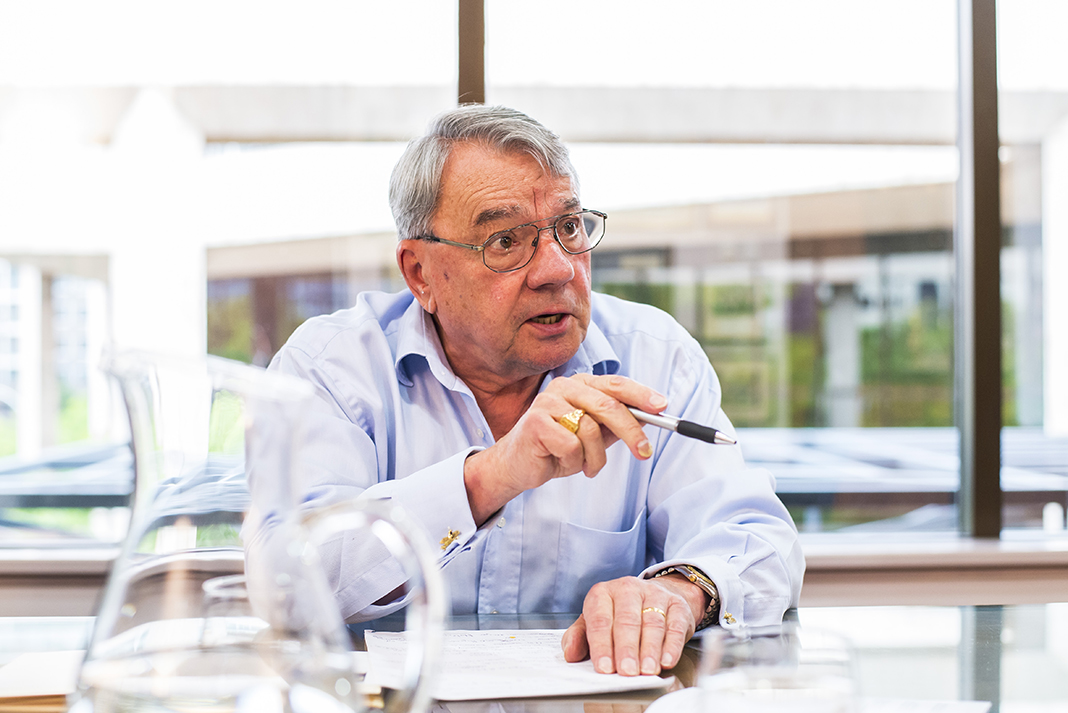
Photo by John Krüger
“As a winemaker, you weren’t even allowed to communicate with other winemakers, that’s how the industry was – you may exchange secrets! Of course, there was no such thing as a secret but it was an interesting period.”
Enter the Friday night “Horse and Herring Club” – a social group Wolf instigated to create some camaraderie between winemakers from different wineries who would bring bottles of wine along to share.
“There was no delicatessen shops, nothing, the only thing was herring in tins and biscuits – that’s what we were eating and we had a punt on the horses at the weekend.
“We became socially engaged,” he says, valuing the friendships made.
His three year contract now at an end, Wolf moved to Thebarton and worked as a freelance technical advisor seven days a week and clocking up thousands of kilometres in his 1957 VW Beetle serving well known wineries.
“I was working for $2.50 an hour!” says Wolf.
“I started as a consultant with overalls and rubber boots to convert these companies from port and sweet wines into table wines. It was a tough period.”
The wines he was making for others were soon noticed by wine judges and critics.
“Then I think, I’ll do something on my own while I was helping all these other guys. But, of course, I didn’t have any money – I started with peanuts!”
It was on a wine tasting stop in Victoria’s Great Western region, during an annual trip to the Melbourne Football Grand Final with Nuriootpa Football Club friends, Peter Rosenberg and Brian Kalleske, that Wolf bought two hogsheads of Malbec. He would blend this purchase with Shiraz from Langhorne Creek to create his very first wine in 1966, the same year he registered the business name “Bilyara”, the aboriginal name for “Eaglehawk” which would feature so prominently on labels and publicity in the future.
“That was a big deal….my first venture, 2,500 bottles.
“Brian Linke, the baker and my late friend, he lent me some money to buy some grapes.”
In 1969, Wolf stopped consulting, taking up a contract as manager and chief winemaker at Tolley Scott and Tolley.
“Within three years, Tolley’s became the most successful red wine producer in Australia – unheard of! Against the total bl***y lot!”
Meanwhile, Wolf continued his own production after hours with assistance from grape growers and wine industry colleagues, particularly Darkie Liebich from Rovally Wines who bottled Wolf’s “first big” vintage in 1967, free of charge.
“I think it was 1,500 dozen, that was lots…. He gave this to me as a gift because I made sparkling wine for him which was called Charmane and it became the number one sparkling wine in South Australia.”
Wolf bought an “old army shed” on the Sturt Highway and together with “another chap called Bob Cundy” worked tirelessly on a bold new venture.
“Then came the confrontation between Tolley Scott and Tolley management and me, Wolf Blass,” he says with fire in his eyes, his hands now clenched tightly on the board room table.
“Are you going to maintain your own production or do you want to stay in our company 100 per cent? You cannot have both ways.
“I went to the telephone and phoned up all my friends which I helped in the past and they said we’ll help you… I went back into the board room and I told them in the Australian language – you can stick it!”
Having built up his stock since 1966, he began Wolf Blass Wines International in 1973 with a $2,000 overdraft arranged by his bank manager at the time, Kapunda’s Bill Adams.
“My stock was stored in Greenock at the garage from Norton Schluter!” he says, dropping the name of another local identity
“John Glaetzer’s wife was in charge of hand labelling and Elsie Tamke, they did the hand labelling for the ’66, ’67 and ’68.”
“Nothing went wrong… I won the packaging award, I won three Jimmy Watson, John Glaetzer joined me. I could have jumped off the sixth floor of the Hilton Hotel and I wouldn’t have broken a leg!”
Sensational publicity with Wolf quoted as saying, “My wines make weak men strong and strong women weak!” captured people’s imagination along with the barrage of medals and trophies from national and international wine shows which Wolf says was described as “obscene”.
He coins the phrase, “No medals – no job” and provides employment and success to associated local businesses as wine production soared to dizzying heights to meet international markets in 30 countries.
“We were selling bl***y wine everywhere!” says Wolf who was spending months overseas expanding a powerful distribution network.
But something had to give.
“I got a little bit toey because my marriage broke up…The company became pretty big and I started worrying about it so I said I better become a public listed company.”
The company would eventually merge with Mildara to form Mildara Blass which would be acquired by Foster’s five years later for $560 million.
Today, the Wolf Blass label continues to be a key brand in the Treasury Wine Estates portfolio.
Wolf describes, in gripping detail, a cut-throat business world with chance meetings in hotel foyers, amalgamations, takeover bids, life changing decisions and deal sealing handshakes.
Looking back, there are “no regrets” and whilst he is no longer an executive of the company, he is still working five days a week.
“My job is now looking at the Wolf Blass Foundation project and from the $1 million which I put in when I was 60 years of age, I’ve developed the finance up to $7 million – I must know how to run a business!” he says.
There’s a flashy new project on his mind and he reveals the plans for his latest venture.
“Now I’m putting a $3.5 million project up in Hahndorf – the Wolf Blass Gallery and Museum.
“I will not say this is my last one, but it is a big project – it’s going to be huge!”
The Wolf Blass legend will live on.
“Never stop, just keep going…that’s my motto!”
“I turned the bl***y place upside down”, says Wolf Blass describing his arrival in the Barossa.
He cheekily selects a book and flicks to the preface written by the late Len Evans to answer the question of how he would describe himself.
“I found him determined, argumentative, ebullient, assertive and idealistic,” Wolf reads out loud.
He doesn’t disagree.
“That’s how he saw me, I do not judge myself, I leave it to others!” he laughs.
There is no doubt Wolf has worked hard all his life, but there was fun to be had along the way.
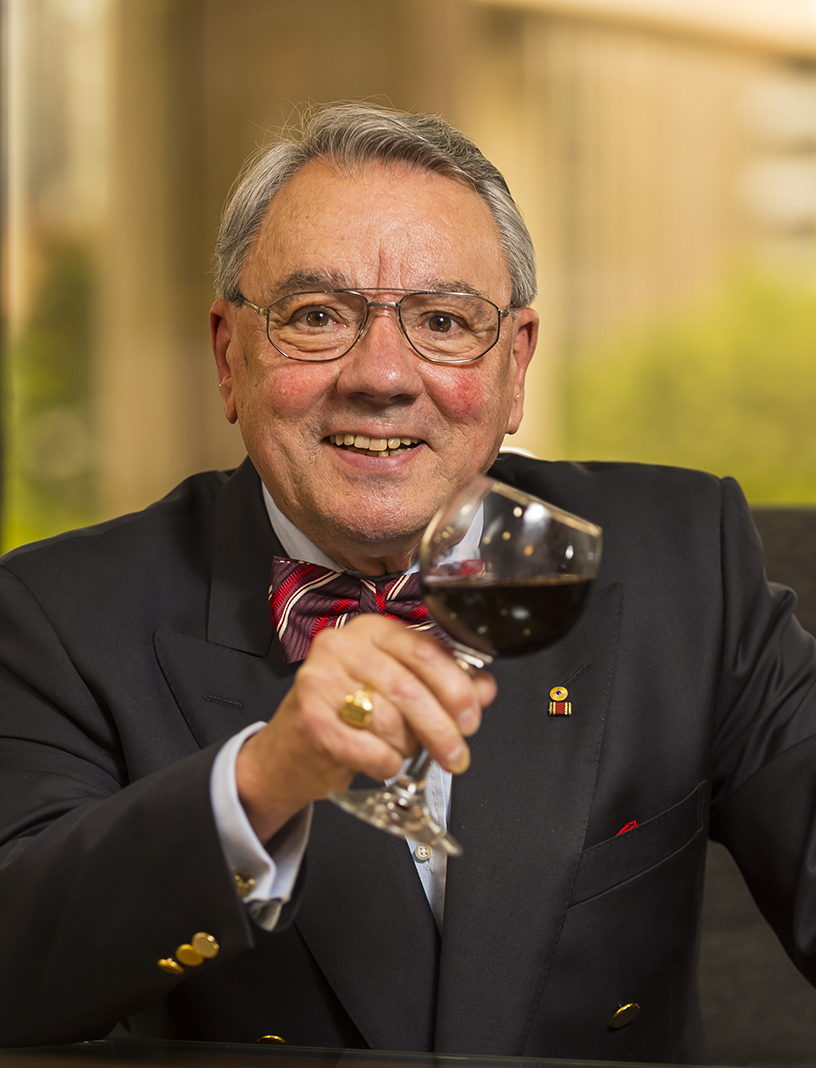
Photo by John Krüger
He enjoys, and has sponsored, the Nuriootpa Rover Football Club, Barossa Car Club, horse racing, snow skiing and pistol shooting and has revelled in the traditions and supported the Adelaide German Club and Barossa Vintage Festival over the years.
He even played the drum kit, honing his skills on one he kept in his wine cellar at home.
“When I was young I liked jazz, I was sponsor of the Kit Kat Club – you’ve got no idea! Anything with action, I was there!”
Currently the “number two” member of the Greenock Business Luncheon Club, a social group which he says has been “sticking together” for more than half a century, he says, “This is when you make business”.
“Initially it was a group of people who also promoted the Barossa Valley and we invited distributors… It was all part of a very happy luncheon arrangement with a lot of fun. Today you don’t do that, you don’t look in each other’s face, you are playing around with a bl***y mickey mouse machine!”
Happily married to his third wife, Shirley, Wolf says, “She put the white flag up!”
As one of the true characters of the wine industry, Wolf is known for his snappy dressing and bow tie which is as famous as the winery he founded.
“It had something to do with when I was a consultant. I had a normal tie and had overalls… running around. The tie was always dangling around! So I said, even if I’ve got rubber boots on, I like to be well presented so I put the bow tie on – it may sound crazy but it is as simple as that – a touch of class.”
Within every legend there is a little larrikin and Wolf describes the fun-filled rivalry between wine makers of the time.
“Peter Lehmann, at the Bacchus Club, presented a wine made out of apples… He fooled everyone, nobody knew what it was.
“What I did, next vintage, I had some peaches and one of the girls at the office, she came in and had to throw peaches into the crusher. We had made a red wine with a lot of peaches in the stuff and left one hogshead fermenting, processing in a different manner. I was trying to get back at Peter Lehmann….it turned out a bl***y sensation!
“I think the wine industry is fun…it’s all there for enjoyment. Now, if you don’t enjoy this, how can you make other people happy?”
♦♦♦



